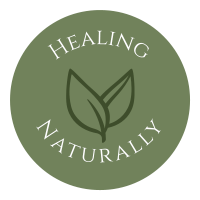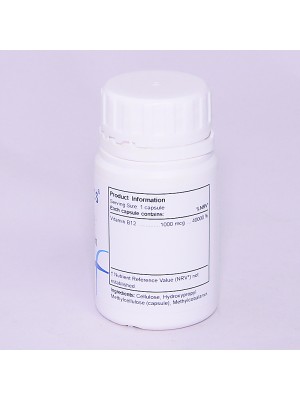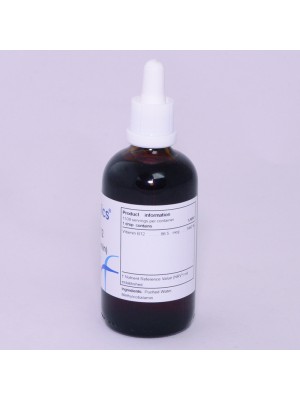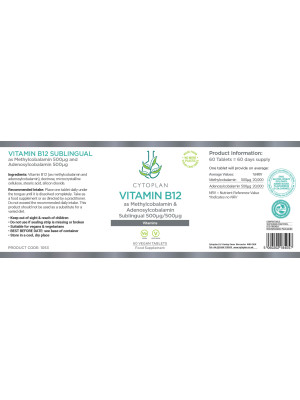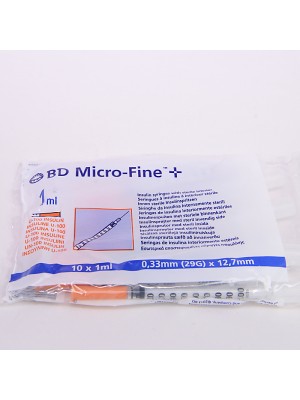
Do you need a B12 boost?
Lost your va va voom? Been feeling fed up or lacking in energy for a while? Maybe, like many people, you have low levels of vitamin B12.
What is vitamin B12?
The two forms of vitamin B12 which are active in human metabolism are methylcobalamin and 5-deoxyadenosylcobalamin (cobalamin indicates that they contain cobalt). Humans cannot make vitamin B12 ourselves, so we must source it in food, where the highest levels are found in grass-fed red meat, grass-fed dairy, and wild fish. Modern diets of ultra-processed food and diets low in animal products increase the risk of B12 deficiency.
A severe B12 deficiency can be caused by a condition called pernicious anaemia, which is caused by an autoimmune disease. This can be treated with injections of B12.
What are the benefits of an optimal B12 level?
- Balances your mood – B12 regulates production of compounds which help us deal with stress and regulate mood.
- Improves cognitive function – studies highlight vitamin B12’s role in concentration and learning, so a deficiency can increase the risk for attention disorders, Alzheimer’s disease & Parkinson’s disease.
- Increases energy levels – good levels of B12 helps your body use glucose to produce the energy you need without feeling tired.
- Protects cardiovascular health – vitamin B12 protects against heart attack or stroke by lowering homocysteine levels, a major risk factor for cardiovascular issues, and by reducing the build-up of plaques in arteries.
- Boosts skin and hair – B12 is essential for healthy cell reproduction, which is critical to keep skin and hair healthy. Optimising levels of B12 reduces hair breakage, strengthens nails and reduces redness, dryness, inflammation and acne blemishes.
- Aids digestion – B12 plays a role in the production of digestive enzymes, which are needed to extract all nutrients from our food and to create a healthy gut microbiome.
- Reduces the risk of birth defects – B12 is needed for the creation of DNA which is used as the blueprint for the entire body. B12 also enables the body to access folate, which is needed for DNA synthesis. Low B12 increases the risk of birth defects such as neural tube defect.
- Reduces nerve damage – B12 has been shown to stimulate regrowth of various nerve cells after injury.
Here are some of the signs you may have low B12 levels:
- Feeling constantly tired or fatigued
- Muscle aches or weakness
- Numbness or a feeling of pins and needles
- Shortness of breath or dizziness
- Poor concentration or memory loss
- Mood changes, like increased depression and anxiety
- Heart problems or palpitations
- Bleeding gums, a persistent sore tongue or frequent mouth ulcers
- Skin rashes
Who’s at higher risk of low B12?
- Older adults who tend to produce less stomach acid, which is needed to convert the vitamin properly.
- People with digestive disorders, like celiac or Crohn’s disease which inhibits absorption in the gut.
- People regularly taking indigestion medication, such as proton pump inhibitors, as these reduce stomach acid, needed for B12 absorption.
- People who don’t eat enough good quality meat and dairy products, as these are the main sources of B12 in our diet. If you change your diet, it may take several years for B12 levels to become depleted, because it is stored in the body and can take several years to become deficient.
- Smokers are at higher risk because nicotine can block absorption.
- Alcoholics tend to have inflammation of the digestive tract, which leads to poor absorption. There is also evidence that alcohol increases loss of B12 in urine.
- Low B12 is a risk factor for some cancers, so cancer patients may already be low in B12. In addition, treatments such as chemotherapy disrupt the digestion, which may reduce absorption of B12 in the gut.
What are the best food sources of B12:
- Grass-fed beef
- Organ meats
- Wild caught fish
- Nutritional yeast
- Organic, grass-fed dairy products
- Free-range eggs
What should you look for in a supplement?
If you are experiencing some of the symptoms or have identified one or more of the risk factors mentioned, you may benefit from supplementing your vitamin B12 intake, to see if some of the symptoms improve. If so, you should look for supplements which provide B12 in the form methylcobalamin, as this is the form found in food, which means it is more easily absorbed by the body.
A general recommended dose is 1000mcg a day, which you should take alongside 400mg of folic acid. If you are deficient, a higher dose of B12 may be needed and, in certain cases an injection may be necessary. Excess B12 is readily excreted in urine.
Related products
Humans need 13 different vitamins to sustain life and health. If we do not take in enough of a particular vitamin our bodily supplies decrease and a deficiency ensues.Of the 13 vitamins our bodies need, one is B12. It is unique because it is the only vitamin that cannot be obtained from plants or sunlight, it is produced by bacteria in the gut of animals and absorbed in the small intestine. Therefore to obtain B12 from the diet you need to eat animal products- meat, fish or dairy products. However even a diet high in these foods may not supply enough B12. In fact it is remarkably easy to become deficient in B12 as many people can neither absorb nor use B12. Vegans and vegetarians are particularly prone to deficiency. What does Vitamin B12 do? It contributes to the reduction of tiredness and fatigue It contributes to normal energy yielding metabolism It contributes to normal functioning of the nervous system It contributes to normal red blood cell formation It has a role in the process of cell division It contributes to normal homocysteine metabolism It contributes to normal psychological function It contributes to normal functioning of the immune system Directions: Recommended dose 1 capsule per day with food. Consume within three months of opening. Warning: If pregnant or breast feeding, consult your health care practitioner before using. This product should not be used as a substitute for a varied diet. Ingredients: (Each capsule contains) Methylcobalamin (Vitamin B12) 1000mcg ( 1mg ) Other ingredients; Cellulose, Hydroxypropyl Methylcellulose (capsule)..
Add to CartHumans need 13 different vitamins to sustain life and health. If we do not take in enough of a particular vitamin our bodily supplies decrease and a deficiency ensues.Of the 13 vitamins our bodies need, one is B12. It is unique because it is the only vitamin that cannot be obtained from plants or sunlight (as plants do not need B12, so do not produce or store it), it is produced by bacteria in the gut of animals and absorbed in the small intestine. Therefore to obtain B12 from the diet you need to eat animal products- meat, fish or dairy products. However even a diet high in these foods may not supply enough B12. In fact it is remarkably easy to become deficient in B12 as many people can neither absorb nor use B12. Vegans and vegetarians are particularly prone to deficiency. What does Vitamin B12 do? It contributes to the reduction of tiredness and fatigue It contributes to normal energy yielding metabolism It contributes to normal functioning of the nervous system It contributes to normal red blood cell formation It has a role in the process of cell division It contributes to normal homocysteine metabolism It contributes to normal psychological function It contributes to normal functioning of the immune system Ingredients: Each drop contains - Methylcobalamin (Vitamin B12) 99.8mcg Directions: Recommended dose 1 drop per day in water with food. Consume within three months of opening. This product is suitable for vegetarians and vegans. Warning: If pregnant or breast feeding, consult your health care practitioner before using. This product should not be used as a substitute for a varied diet...
Add to CartB12 is needed to prevent anaemia; aids folic acid in regulating formation of red blood cells; helps utilization of iron. It Is also required for proper digestion, absorption of foods, synthesis of protein, metabolism of carbs and fats. Strict vegetarians must remember to boost B12 intake, as this vitamin is found almost exclusively in animal tissues.This is an intramuscular injection that should be administered through the fatty tissue into the "gluteus medius".Each ml contains 1000mcg of hydroxocabalamin in injectable water. The bottle should be refrigerated after first use. The top is self-sealing and the product can be used for up to a year after first use...
Add to CartA high potency active B12 supplement containing a combined dose of 1mg of methylcobalamin and adenosylcobalamin (i.e. 500µg of each), which are both active forms of this vitamin. People at particular risk of vitamin B12 deficiency include: those eating a vegan or vegetarian diet, people with low stomach acid or other digestive conditions leading to malabsorption (and some prescription medications can reduce B12).A high potency active B12 supplement containing 500µg of methylcobalamin and 500µg adenosylcobalamin, which are both active forms of this important vitamin. Sublingual means beneath the tongue and these tablets will dissolve in the mouth allowing oral absorption Methylcobalamin is the active form used in the methylation cycle. Methylation reactions occur in every cell in the body – there are more than a billion per second Adenosylcobalamin is the active form that is used in the mitochondria (which are the energy power houses of cells) Vegan and vegetarian diets can be low in B12 Other people at risk of low B12 include those with digestive conditions that lead to malabsorption; low stomach acid (e.g. due to long-term antacid medication, proton pump inhibitors, H2 blockers, ageing or zinc deficiency); surgery where nitrous oxide has been used as an anaesthetic; and other prescription medications which impair B12 absorption (e.g. metformin, colchicine, neomycin and others) Vitamin B12 contributes to normal: energy-yielding metabolism functioning of the nervous system homocysteine metabolism psychological function red blood cell formation immune system function Vitamin B12 contributes to the reduction of tiredness and fatigue Vitamin B12 has a role in the process of cell divisionMethylcobalamin 500µg Adenosylcobalamin 500µg Ingredients: Vitamin B12 (as methylcobalamin and adenosylcobalamin), dextrose, microcrystalline cellulose, stearic acid. Suggested Intake: Place one tablet daily under the tongue until it is dissolved completely. Take as a food supplement or as directed by a practitioner. Do not exceed the recommended daily intake. This product should not be used as a substitute for a varied diet. Suitable for: vegans and vegetarians. Contraindications: If you have recently had coronary stent surgery do not take except under medical advice..
Add to CartWE CAN ONLY SHIP THIS ITEM TO MAINLAND UKSyringe with Needle 1ml (Insulin type) 29g , pack of 100Small combined needle and syringe which is ideal for injecting B-12..
Add to Cart